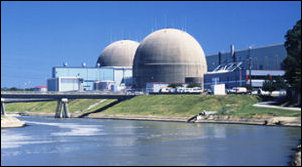
Dominion Energy has filed an application with the Nuclear Regulatory Commission to renew operating licenses for its Surry Power Station for an additional 20 years, the company announced today.
Like all nuclear units, the three-loop Westinghouse pressurized water reactors, capable of generating 1,676 megawatts each, were originally licensed to operate 40 years. Under its current licenses, the two nuclear units are allowed to generate electricity through 2032 and 2033. A second re-licensing would extend their lives through 2052 and 2053. The units account for about 15% of the electricity consumed by Dominion customers.
Dominion also has applied to re-license its two units at the South Anna power station. Between the four units, the utility estimates that it could spend as much as $4 billion on the re-licensing program.
Critics are certain to attack the proposal on the grounds that the power company should not make a long-term commitment to an expensive electric generating source even as the cost of solar power, wind power, and battery-powered backup continue to decline. Dominion argues that the nuclear units will provide a reliable, CO2-free source of base-load electric power. In essence, the critics are advocating a zero-nuclear, renewables-intensive energy policy similar to Germany’s energiewende, which has resulted in high electricity rates and burns CO2-intensive coal to replace the lost nuclear power.
It will make a fascinating debate.

Leave a Reply
You must be logged in to post a comment.